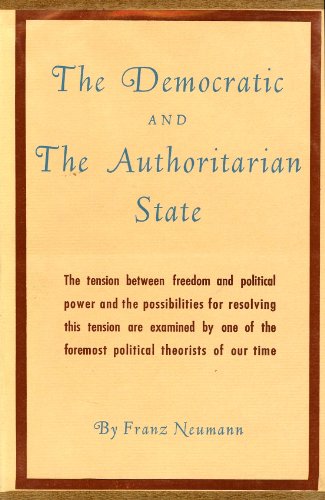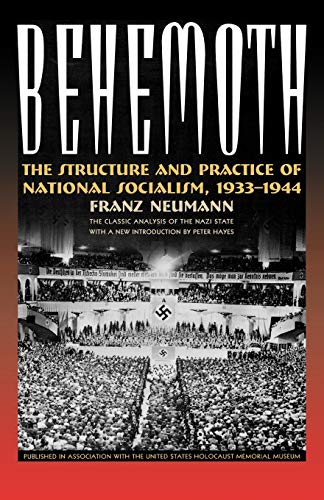Background
Franz Leopold Neumann was born on May 23, 1900 in Kattowitz, Upper Silesia (now Katowice, Poland). He was the son of Josef Neumann, a salesman of leather goods, and Gertrud Gutherz Neumann.



(Essays in Political and Legal theory)
Essays in Political and Legal theory
https://www.amazon.com/democratic-authoritarian-state-Essays-political/dp/B000R0EPLI?SubscriptionId=AKIAJRRWTH346WSPOAFQ&tag=prabook-20&linkCode=sp1&camp=2025&creative=165953&creativeASIN=B000R0EPLI

(Franz Neumann's classic account of the governmental worki...)
Franz Neumann's classic account of the governmental workings of Nazi Germany, first published in 1942, is reprinted in a new paperback edition with an introduction by the distinguished historian Peter Hayes. Neumann was one of the only early Frankfurt School thinkers to examine seriously the problem of political institutions. After the rise of the Nazis to power, his emphasis shifted to an analysis of economic power, and then after the war to political psychology. But his contributions in Behemoth were groundbreaking: that the Nazi organization of society involved the collapse of traditional ideas of the state, of ideology, of law, and even of any underlying rationality. The book must be "studied, not simply read," Raul Hilberg wrote.
https://www.amazon.com/Behemoth-Structure-Practice-Socialism-1933-1944/dp/1566638194?SubscriptionId=AKIAJRRWTH346WSPOAFQ&tag=prabook-20&linkCode=sp1&camp=2025&creative=165953&creativeASIN=1566638194
Franz Leopold Neumann was born on May 23, 1900 in Kattowitz, Upper Silesia (now Katowice, Poland). He was the son of Josef Neumann, a salesman of leather goods, and Gertrud Gutherz Neumann.
Neumann received an early political education in the radical soldiers' councils that were created after Germany's defeat.
After World War I he studied at the universities of Breslau, Leipzig, and Rostock, and also at Frankfurt as a student of Hugo Sinzheimer. In 1923 he received the Legum Doctor at Frankfurt; four years later he was admitted to the Berlin bar.
In England Neumann enrolled at the London School of Economics. In 1936 he received the Doctor of Philosophy in political science under the direction of Harold Laski.
Shortly before his death, he received an honorary degree from the Free University of Berlin, which he had helped to create after the war.
Neumann served in the German army during World War I.
During the last years of the Weimar Republic, he acted as legal adviser to the Social Democratic party, wrote for Die Arbeit and Die Gesellschaft, and taught at the Deutsche Hochschule für Politik.
Since prospects for émigré scholars were limited in England, Neumann accepted an invitation to join the Institute of Social Research at Columbia University. The Institute for Social Research was itself a recent transplant from Germany, brought from Frankfurt via Geneva in 1934. Neumann's colleagues during his six-year tenure included Max Horkheimer, Herbert Marcuse, Leo Lowenthal, Theodor W. Adorno, Otto Kirchheimer, Erich Fromm, Friedrich Pollock, and A. R. L. Gurland.
He published a number of studies in the institute's journal, the Zeitschrift für Sozialforschung.
In 1942 Neumann became a consultant to the Board of Economic Warfare; in 1943 he joined the Office of Secret Services; and in 1945 he was chosen to head the German Research section of the Department of State. He also published a study, The Fate of Small Business in Nazi Germany, in collaboration with Kirchheimer and Gurland for a Senate subcommittee on small business in 1943. Neumann remained at the Department of State until 1947, when he became professor of government at Columbia University. He taught there until his premature death in an automobile accident in Switzerland.
Neumann's close friend Herbert Marcuse, who had married his widow, edited a collection of his essays written during three decades, The Democratic and Authoritarian State. A number of observers remarked on the declining faith in Marxism evident in the more recent contributions. The last essay, "Anxiety and Politics, " which Neumann had delivered as a lecture when receiving his honorary degree, revealed a new but inchoate interest in the psychological perspective that had been absent in Behemoth.
In addition to his writings, Neumann was highly influential as a teacher and colleague. From the testimony of his students, as well as that of such former colleagues as Herbert Marcuse, Otto Kirchheimer, and H. Stuart Hughes, it is clear that Neumann represented a model of politically engaged scholarship of the highest order.
Neumann is considered to be among the founders of modern political science in the Federal Republic of Germany. His most important and controversial work was Behemoth: The Structure and Practice of National Socialism (1942) where Neumann used a sophisticated Marxist analysis to demonstrate the extent to which Nazism operated in the service of monopoly capitalism.
(Franz Neumann's classic account of the governmental worki...)
(Essays in Political and Legal theory)
Neumann was an active opponent of the Nazis. His views clashed with those of Friedrich Pollock, whose analysis of Nazism as a variant of state capitalism stressed the relative autonomy of politics.
During World War II, Neumann continued his struggle against Nazism through more direct participation in governmental affairs.
On January 1, 1937, shortly after moving to New York, Neumann married Inge S. Werner, originally from Magdeburg. They had two sons.
salesman
